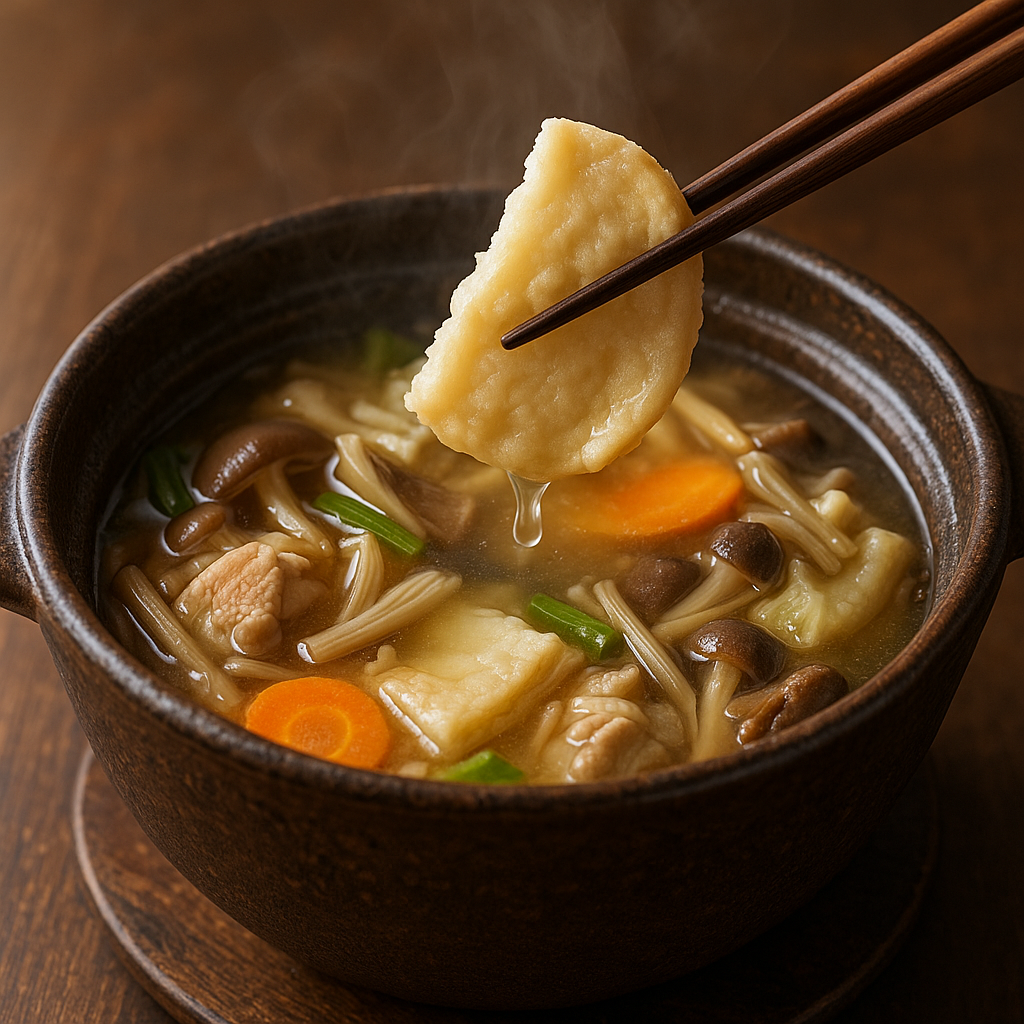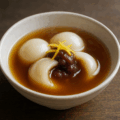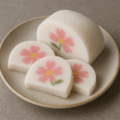せんべい汁の特徴
八戸発・南部せんべいを使う郷土汁
せんべい汁は青森県八戸を中心に親しまれる郷土料理。小麦粉で作られた「おつゆせんべい」を割り入れて煮込み、だしを吸わせて楽しみます。
モチッとした食感と香ばしさ
汁専用の南部せんべいは煮ても崩れにくく、外はつるん、中はもっちり。割り入れの大きさや煮込み時間で食感の変化も楽しめます。
鶏だし×根菜・きのこで旨みたっぷり
鶏肉のコクに、ごぼうやきのこの香りが重なり、醤油ベースの素朴な味わいに仕上がります。
せんべい汁のレシピ
材料(4人分)
- おつゆせんべい(南部せんべい・汁用) … 8〜10枚
- 鶏もも肉 … 250g(一口大)
- にんじん … 1/2本(短冊)
- しめじ … 1パック(小房)
- こんにゃく … 1/2枚(手でちぎる/下茹で)
- 長ネギ…適量
- 油 … 小さじ1(炒め用・省略可)
だし・調味
- 水 … 1,200ml
- 昆布 … 5×10cm 1枚
- 煮干し … 10g(またはかつお節 8g)
- 醤油 … 大さじ3〜4
- 酒 … 大さじ2
- みりん … 大さじ1(お好みで)
- 塩 … 少々(味を見て調整)
作り方
- だし:鍋に水・昆布・煮干しを入れ弱火で加熱。沸騰直前に昆布を外し、5分ほどで煮干しを取り除く。
- 具を煮る:鶏肉・にんじん・こんにゃく・きのこを加え、中火で8〜10分。アクを取り、醤油・酒・みりんで調える。
- せんべい:せんべいを食べやすく割り、食べる直前に鍋へ。2〜4分を目安に、中心にやや芯が残る程度で火を止める。
- 仕上げ:長ねぎを加えてひと煮立ち。塩で味を整え、器に盛る。
シェフのワンポイントアドバイス
必ず汁用の南部せんべいを使用。煮込みすぎると溶けやすいので、人数分を数回に分けて加えると最後まで食感が保てます。
作り置きの場合は、具と汁だけ先に仕上げ、せんべいは提供直前に入れるのがコツ。
しょうゆを控えめにして最後に追い醤油で香りを立てるのもおすすめです。
栄養価(1杯の目安)
- エネルギー:約280〜380 kcal
- たんぱく質:15〜20 g
- 脂質:8〜14 g
- 炭水化物:40〜55 g
- 食物繊維(ごぼう・きのこ由来)/鉄・亜鉛(鶏肉由来)
油控えめでバランス良好。せんべい枚数でボリュームと糖質を調整できます。
歴史
南部せんべいの活用から生まれた鍋文化
保存性の高い南部せんべいを汁物に応用したのがはじまり。行商や農作業の合間に食べやすい“腹持ちの良い一杯”として広まりました。
家庭ごとに広がるバリエーション
鶏・豚・魚介、味噌仕立てや醤油仕立てなど多彩。八戸周辺ではしょうゆ味+根菜・きのこが定番として親しまれています。
English Version
Features of Senbei-jiru
A Hachinohe Specialty Using Nambu Senbei
Senbei-jiru is a local soup beloved around Hachinohe, Aomori. Soup-only “otsuyu senbei” (wheat crackers) are broken into the pot and simmered so they soak up the broth.
Chewy Texture with a Toasty Note
Soup-dedicated Nambu senbei hold their shape when simmered—silky on the outside, pleasantly chewy inside. Varying piece size and simmer time lets you fine-tune the texture.
Umami-Rich: Chicken Broth × Roots & Mushrooms
Chicken adds depth while burdock-like aromas from vegetables and mushrooms (here using shimeji) layer into a simple soy-based profile.
Recipe
Ingredients (serves 4)
- Otsuyu senbei (Nambu senbei for soup) … 8–10 pieces
- Chicken thigh … 250 g (bite-size)
- Carrot … 1/2 (thin slices)
- Shimeji mushrooms … 1 pack (separated)
- Konnyaku … 1/2 slab (tear by hand; parboil)
- Long green onion (negi) … to taste
- Oil … 1 tsp (for sautéing; optional)
Broth & Seasoning
- Water … 1,200 ml
- Kombu … 1 piece (5 × 10 cm)
- Niboshi … 10 g (or katsuobushi 8 g)
- Soy sauce … 3–4 tbsp
- Sake … 2 tbsp
- Mirin … 1 tbsp (optional)
- Salt … a pinch (to taste)
Instructions
- Broth: Combine water, kombu, and niboshi in a pot and heat gently. Remove kombu just before boiling; remove niboshi after about 5 minutes.
- Simmer the ingredients: Add chicken, carrot, konnyaku, and mushrooms. Simmer over medium heat 8–10 minutes, skimming foam. Season with soy sauce, sake, and mirin.
- Senbei: Break senbei into bite-size pieces and add just before serving. Simmer 2–4 minutes, stopping while a slight core remains.
- Finish: Add sliced negi and bring briefly to a boil. Adjust salt and ladle into bowls.
Chef’s Tip
Always use soup-use Nambu senbei. To keep texture to the end, avoid overcooking and add senbei in several small batches for the number of servings.
For make-ahead, finish the broth and toppings first; add senbei only right before serving.
Use a lighter hand with soy sauce and finish with a quick splash of soy in the bowl for aroma.
Nutritional Value (per bowl, approx.)
- Calories: 280–380 kcal
- Protein: 15–20 g
- Fat: 8–14 g
- Carbohydrates: 40–55 g
- Dietary fiber (from mushrooms/vegetables) / Iron & zinc (from chicken)
Balanced and relatively light on oil. Adjust the number of senbei pieces to tune volume and carbs.
History
A Pot Culture Born from Using Nambu Senbei
The durable Nambu senbei were adapted to soups, spreading as a filling, easy-to-eat bowl for peddlers and farm workers.
Household Variations
Broths range from chicken to pork or seafood, and from soy to miso styles. Around Hachinohe, soy-based broth with roots and mushrooms is the classic.



何でも質問してください!